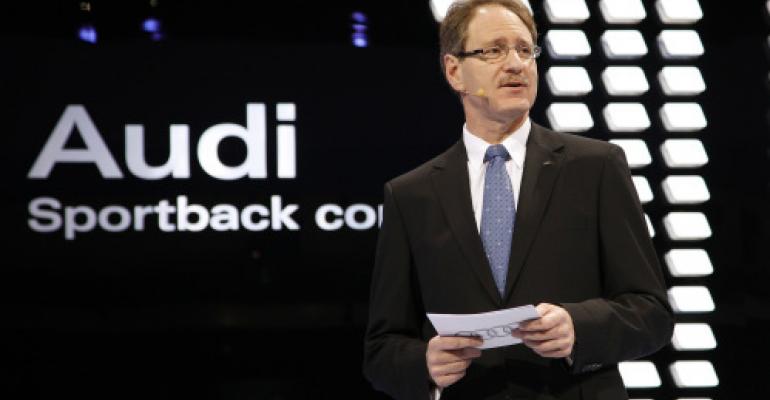DETROIT – Audi has given the green light to its first vehicle-assembly plant in North America; it’s just a matter of when and where, confirms a top U.S. official.
Chattanooga, TN, home to parent Volkswagen’s new Passat plant and a onetime front-runner site for an Audi facility, appears to have been scratched from the list, while Mexico is beginning to loom large.
Supplier sources told WardsAuto in November that Audi was zeroing in on Mexico as its chosen locale, and CEO Rupert Stadler cites that country’s labor flexibility and lower-wage advantages in a Jan. 8 interview with a German newspaper.
Audi of America President Johan de Nysschen insists no site decision has been made, but he ticks off the merits of Mexico in an interview on the sidelines of the North American International Auto Show this week.
“It’s not a matter of if we will do a plant in North America, but when,” de Nysschen tells WardsAuto. “The decision to do a plant, technically we’ve reached that conclusion. It’s a matter now of waiting to pull the trigger.”
Although the European Union’s recent economic woes means short-term Audi will benefit in the U.S. from a weaker euro, the auto maker ultimately will need production in the dollar zone as a hedge against unfavorable currency fluctuations.
“As our business in the U.S. grows, we begin to expose a far larger part of Audi’s (overall) business to the exchange rate,” de Nysschen says. “We will be a $7.5 billion business in the very near future, and you don’t want to park that money out in the rain.
“Getting a plant allows us to have a higher degree of U.S. content. It allows us to have a natural hedge against that.”
De Nysschen says Audi’s performance in the U.S. “determines when we can make the decision,” citing the need to have one vehicle line at a volume of at least 100,000 units per year to make local production viable.
“Even though we’re talking of all-time (sales) records for Audi, we did (only) 117,500 units across all car lines (in the U.S. in 2011),” he says. “So that means not one car is at critical mass.
“We’ve got to build our business to get to the point where, with a combination of production for the U.S. and some exports to other markets, we can get the economies of scale to make that factory work.”
Volkswagen Group’s plan to have a single vehicle architecture that can provide the building blocks for every vehicle in its multi-brand lineup with a transverse-mounted engine could help give Audi the economies of scale it needs while producing several different vehicles in a single plant.
Designating the North American facility as the global supplier for a particular model also would help boost volumes to required levels.
“One advantage of Mexico is that you could support the growing markets down in South America, Brazil,” de Nysschen says, alluding to free-trade pacts between the countries that would cut import costs. “More so, you have the benefit of exporting cars into Europe duty-free.
“But there are many other significant, compelling cases for setting up the plant in the U.S.,” he adds. “I can confirm that no final decision has been made.”
Chattanooga is not a candidate, he says, because “Our Volkswagen colleagues have got ambitions of their own in terms of developing the business here, and the Chattanooga capacity will be required by the VW brand.”





